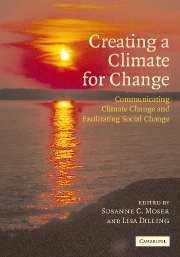Book contents
- Frontmatter
- Contents
- Preface
- Foreword
- List of contributors
- List of tables
- List of figures
- List of text boxes
- Introduction
- Part I Communicating climate change
- 1 Weather or climate change?
- 2 Communicating the risks of global warming: American risk perceptions, affective images, and interpretive communities
- 3 More bad news: the risk of neglecting emotional responses to climate change information
- 4 Public scares: changing the issue culture
- 5 The challenge of trying to make a difference using media messages
- 6 Listening to the audience: San Diego hones its communication strategy by soliciting residents' views
- 7 The climate-justice link: communicating risk with low-income and minority audiences
- 8 Postcards from the (not so) frozen North: talking about climate change in Alaska
- 9 Climate change: a moral issue
- 10 Einstein, Roosevelt, and the atom bomb: lessons learned for scientists communicating climate change
- 11 Across the great divide: supporting scientists as effective messengers in the public sphere
- 12 Dealing with climate change contrarians
- 13 A role for dialogue in communication about climate change
- 14 Information is not enough
- Part II Facilitating social change
- Part III Creating a climate for change
- About the authors
- Index
- References
1 - Weather or climate change?
Published online by Cambridge University Press: 20 August 2009
- Frontmatter
- Contents
- Preface
- Foreword
- List of contributors
- List of tables
- List of figures
- List of text boxes
- Introduction
- Part I Communicating climate change
- 1 Weather or climate change?
- 2 Communicating the risks of global warming: American risk perceptions, affective images, and interpretive communities
- 3 More bad news: the risk of neglecting emotional responses to climate change information
- 4 Public scares: changing the issue culture
- 5 The challenge of trying to make a difference using media messages
- 6 Listening to the audience: San Diego hones its communication strategy by soliciting residents' views
- 7 The climate-justice link: communicating risk with low-income and minority audiences
- 8 Postcards from the (not so) frozen North: talking about climate change in Alaska
- 9 Climate change: a moral issue
- 10 Einstein, Roosevelt, and the atom bomb: lessons learned for scientists communicating climate change
- 11 Across the great divide: supporting scientists as effective messengers in the public sphere
- 12 Dealing with climate change contrarians
- 13 A role for dialogue in communication about climate change
- 14 Information is not enough
- Part II Facilitating social change
- Part III Creating a climate for change
- About the authors
- Index
- References
Summary
Introduction
No sooner do we start experiencing the world than the world starts shaping our causal beliefs about it, by providing feedback on our actions, predisposing us to expect certain outcomes from particular actions, and thus to link causes to effects. It is only human to generalize and abstract stories from these. While specific actions and their specific consequences may be misremembered or forgotten (Brown, 1990; Koriat et al., 2000; Loftus et al., 1987), their cumulative legacy includes a set of general causal beliefs, or mental models, of how things work. Mental models are our inference engines, how we simulate sequences of events in our minds and predict their outcomes. Add to this vicarious experiences and adopted beliefs – the effects of science education, advertising, and other communications – and people can explain just about anything, including global warming, through the pre-existing lenses of their mental models.
When it comes to communicating climate change, awareness of our own mental models and those of the people we want to communicate with is key. Why? Because our mental models predispose us toward particular ways of thinking about a problem, its causes, effects, and its solutions. In other words, if we hold in our minds a mental model that wrongly captures what causes a problem, our response to the problem will be equally inappropriate. For example, a “heartburn” mental model of chest pains leads some people to take a digestive aid rather than seek timely medical care for heart attacks.
- Type
- Chapter
- Information
- Creating a Climate for ChangeCommunicating Climate Change and Facilitating Social Change, pp. 31 - 43Publisher: Cambridge University PressPrint publication year: 2007
References
- 32
- Cited by



